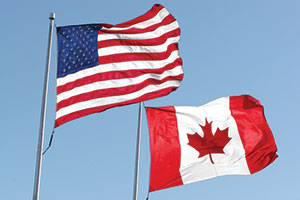Senior Reporter
Border Congestion Feared as Vaccination Requirements Change in January

[Ensure you have all the info you need in these unprecedented times. Subscribe now.]
The flow of freight between the United States and its neighbors Canada and Mexico could slow beginning in January, as all three countries adopt more stringent COVID-19 vaccine requirements for cross-border truck traffic.
JAN. 10 UPDATE: No intervention expected by Jan. 15
“All inbound foreign national travelers seeking to enter the United States via land points of entry or ferry terminals — whether for essential or nonessential reasons — must be fully vaccinated for COVID-19 and provide related proof of vaccination,” said a bulletin from the U.S. Department of Homeland Security. While the Nov. 23 announcement said only that the restrictions would be adopted in January, it’s expected they’ll take effect Jan. 22.
The DHS rule applies to non-U.S. citizens crossing into the country.
The Canadian Ministry of Health’s new regulations, set to take effect Jan. 15, state that certain groups of travelers — among them essential providers such as truck drivers — cannot enter Canada unless they have been fully vaccinated. This applies to U.S. drivers entering the country, a group that previously had been exempt from vaccination requirements.
Mexico’s rule, also set to take effect Jan. 15, states, “all inbound non-immigrant foreign national travelers crossing U.S. land ports of entry or ferry terminals – whether for essential or non-essential reasons – must be fully vaccinated for COVID-19 and provide related proof of vaccination.” Here again, U.S. drivers are included.
American Trucking Associations Chief Economist Bob Costello expressed trepidation about how the flow of freight into and out of the three countries could be affected.
“I am concerned about all of this, and what we need is more time,” Costello told Transport Topics. “It’s not like we are anti-vaccine, but the reality is a lot of these drivers are not vaccinated, and we already have supply chain problems. Our number one export market for U.S. goods is Canada. I don’t want to be alarmist, but this is significant.”
Costello said Canadian officials enacted their tighter vaccine requirements after the U.S. decision.
“Canada had not required its domestic drivers to get vaccinated, so they are only really doing this because the U.S. government has said it will require it for their citizen-drivers,” he said. “The border situation could get really dicey for the supply chains in mid-January when all of this happens.”
Under the Canadian law, to qualify as fully vaccinated, a person must have received, at a minimum, two doses of an approved vaccine or a mix of two of them, or one dose of the one-shot Johnson & Johnson vaccine. And they must have received it at least 14 full days before the date of travel.
In addition to Johnson & Johnson, Canada’s list of approved vaccines includes those produced by AstraZeneca, Biotech, Johnson & Johnson, Moderna, Pfizer-BioNTech, Sinopharm and Sinovac. Mexico’s list is similar but adds the Russian Sputnik V vaccine.
Costello said ATA is working with its Canadian counterpart, the Canadian Trucking Alliance, which is seeking an extension of the rule’s adoption date. He noted that the Canadian government is not planning to offer exemptions for unvaccinated truck drivers.
“You should prepare for mid-January,” Costello said. “Drivers are going to have to show proof of vaccination to enter Canada. I would say this is not going to change.”

U.S. and Canada flags. (KKIDD/Getty Images)
A survey of nearly 1,200 truck drivers released in November by driver recruitment firm Conversion Interactive Agency found that almost 55% of U.S. drivers had received the COVID-19 vaccination, while 36% said they had no intention of receiving it. At the time, about 9% had not received a shot but planned to do so.
“With a significant percentage of drivers having no plans for vaccination, this sets up a challenge for motor carriers depending on how vaccine mandates play out both on the federal and state level,” the report said.
A proposal from the Biden administration that would require vaccinations or regular COVID-19 testing for those working at companies with 100 or more employees is currently on hold, and is being litigated at the federal appeals court level.
It also is receiving Congressional attention. On Dec. 8, the U.S. Senate voted 52 to 48 to approve a proposal that specifically aims to repeal the mandate, but the measure faces an uphill battle in the Democratic-controlled House and an almost certain veto from President Biden.
On Dec. 7, a federal appeals court judge in Savannah, Ga., blocked enforcement of a vaccine requirement for certain federal contractors nationwide. The order means that three vaccine policies for people not employed by the federal government — including contractors, certain health care workers and employees of larger companies — are frozen across the country.
Want more news? Listen to today's daily briefing below or go here for more info:




